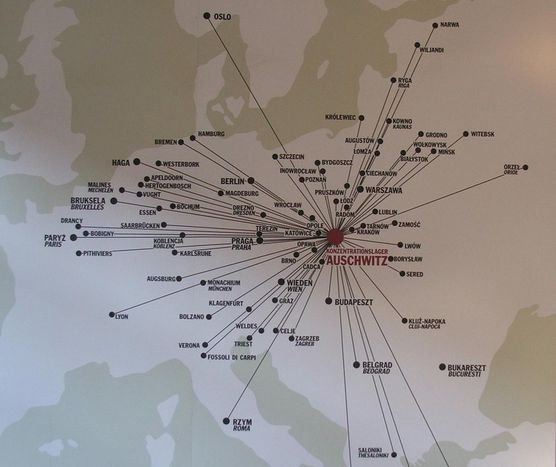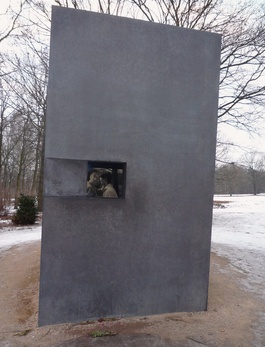
Mahler, Varela, Irving: living alongside Europe's Holocaust deniers
Published on
Translation by:
 Andrew Christie
Andrew Christie
Holocaust deniers are dealt with differently across Europe, although the EU has taken initial steps to standardise laws, with Germany taking the lead
At first glance, Horst Mahler’s whole way of life just seems contradictory: in the sixties he co-founded the RAF (Red Army Faction), whose left-wing terrorism rocked west Germany; in 2000 he became a member of the right-wing extremist party NPD (German National Party), before leaving again in 2003; since 2007 Mahler has distributed various CDs and DVDs containing content denying the Holocaust – a crime in Germany; and now, after all that, the 72-year-old has handed himself in to the authorities. Does this man really know what he is doing?
Holocaust deniers are simply spreading right-wing propaganda
‘I’m standing here because I want to,’ says Mahler curtly at the start of his trial in Munich on 12 January 2009. In order to charge him, the court first has to prove that the Holocaust happened at all. With his short, grey hair and rimless glasses, Mahler, who has six previous convictions, does not look like a right-wing extremist, but the opinions he propagates in the courtroom are shocking. He uses the trial as a stage, airing malicious views of Jewish people throughout, until the judge silences him.
 Mahler, a former law student, has had no income for four years after having had a temporary employment ban imposed upon him. He has already spent nine years in prison for incitement of the people, and twenty-six years for his involvement in the Red Army Faction. The right-wing scene holds him up as a martyr fighting for the truth. Yet no event in human history has been researched more intensively than the Holocaust: those like Mahler who deny it are simply spreading right-wing propaganda, dressed up as a fight for freedom of speech.
Mahler, a former law student, has had no income for four years after having had a temporary employment ban imposed upon him. He has already spent nine years in prison for incitement of the people, and twenty-six years for his involvement in the Red Army Faction. The right-wing scene holds him up as a martyr fighting for the truth. Yet no event in human history has been researched more intensively than the Holocaust: those like Mahler who deny it are simply spreading right-wing propaganda, dressed up as a fight for freedom of speech.
Europe: how to deal with Holocaust deniers?
Horst Mahler is no exception. German-born Australian citizen Dr. Frederik Toben, 65, was imprisoned for a month in London in 2008 at the German government's request. There are also well-known examples of Holocaust deniers in many European countries: British rightwing historian David Irving, 71, went on trial in 2002, as did French former literature professor Robert Faurisson, 70 most recently in 2006, as well as publisher Pedro Varela in Spain. In terms of how the law deals with these people, Europe is far from united. In Austria, France, Poland, Germany, Belgium and Switzerland, questioning or denying the Holocaust can lead to long prison sentences, whereas many other European countries do not impose comparable penalties.
So-called remembrance laws, such as the ban on Holocaust denial, are not without controversy in democratic countries. Indeed, as far as constitutional law is concerned, they are contrary to the freedom of speech and the freedom of science. However, German constitutional law views Holocaust denial as an untrue claim that from the outset is not protected by the freedom of speech. In England, on the other hand, a stricter criminal and constitutional law has so far prevented the introduction of remembrance laws. Freedom of speech is therefore unrestricted. Two years ago in Italy, 150 left- and right-wing historians signed a document expressing their disapproval of a law change which would make Holocaust denial a criminal offence.
 In 2007 the EU took its first steps towards standardisation. A provisional order in April 2007 set out standard minimum penalties to combat racism and xenophobia. It criminalises: ‘public approval, denial or gross minimisation of genocide, crimes against humanity and war crimes, when such crime is directed towards persons in view of their race, skin colour, religion, provenance, or national or ethnic origin.’
In 2007 the EU took its first steps towards standardisation. A provisional order in April 2007 set out standard minimum penalties to combat racism and xenophobia. It criminalises: ‘public approval, denial or gross minimisation of genocide, crimes against humanity and war crimes, when such crime is directed towards persons in view of their race, skin colour, religion, provenance, or national or ethnic origin.’
In this regard, there would be penalties for those who publicly claim that a genocide already recognised by an international court as fact never happened and was invented by the ethnic group in question for financial gain. Such a claim would amount not just to denial, but also incitement to hatred against the ethnic group concerned. Whether an historical crime is classed as genocide, a crime against humanity or a war crime must be determined by the relevant court in each individual case. This decision was long since made in respect of the Holocaust, at the Nuremberg Trials in 1945.
Holocaust denial was decriminalised in Spain and Slovakia
Two years ago, despite all efforts on a European level, Holocaust denial was once again decriminalised in Spain (and Slovakia in 2005). The Spanish constitutional court favoured the freedom of speech – though in contrast, justification either of the Holocaust or genocide of any description remains punishable by up to two years in prison. However, the relaxation of the law in Spain can be attributed to the action against Holocaust denier Pedro Varela. In Germany, Horst Mahler is unlikely to enjoy similar success.
Translated from Mahler, Williamson, Varela, Irving - Zum Umgang mit Holocaustleugnern in Europa


